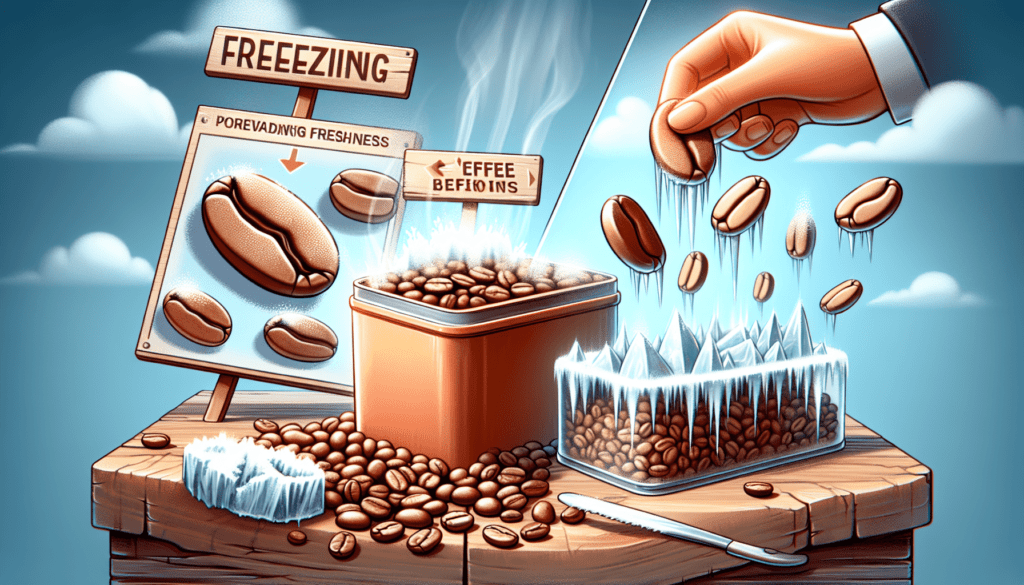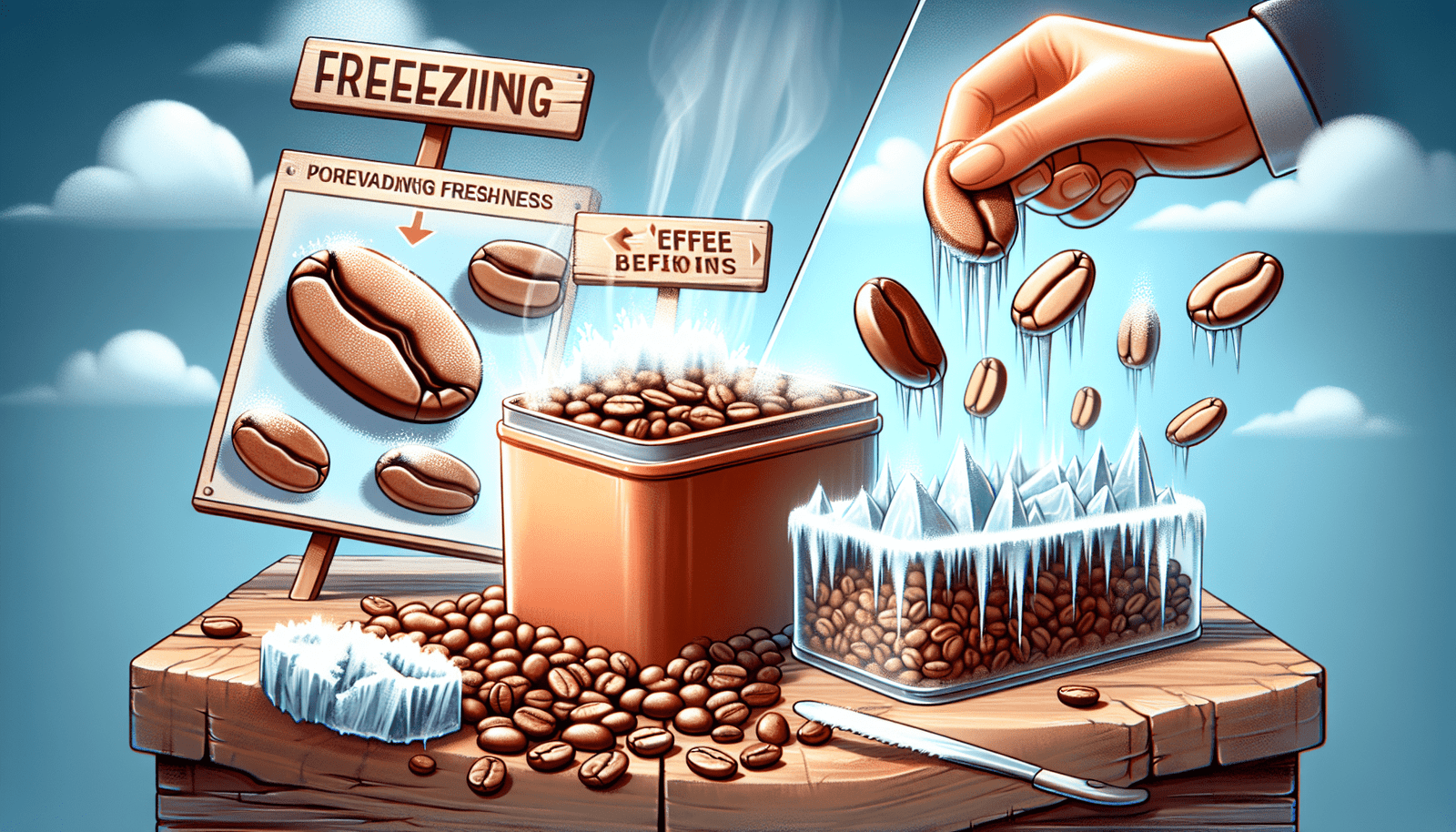Coffee beans, the heart and soul of the caffeinated world, come in various forms and flavors, captivating the taste buds of coffee enthusiasts worldwide. From exploring the nuances of espresso beans to the intriguing concept of chocolate-covered coffee beans, the coffee journey is a delightful one. But have you ever wondered if you can freeze coffee beans? In this article, we will not only unravel the answer to this question but also take you on a grand tour of the coffee world, from the origins of coffee beans to the art of roasting and the different brew methods. So, grab a cup of your favorite brew, and let’s dive into this flavorful adventure.

Can You Freeze Coffee Beans?
If you’re a coffee enthusiast, you may find yourself with a surplus of coffee beans at times. Whether you bought too much or received a generous gift, you may be wondering if you can freeze coffee beans to preserve their freshness and flavor. In this article, we will explore the importance of proper coffee bean storage, the freezing process, the pros and cons of freezing coffee beans, how to prepare them for freezing, and the best methods for thawing and using frozen coffee beans. We will also address frequently asked questions and provide alternative coffee storage methods. So let’s dive in and find out if freezing coffee beans is a viable option!
The Importance of Proper Coffee Bean Storage
Maintaining Freshness
Coffee beans are at their best when they are fresh. The flavors and aromas that make coffee so enjoyable can degrade over time if the beans are not stored properly. Exposure to air, moisture, heat, and light can all contribute to the loss of freshness. Proper storage techniques, such as freezing, can help to preserve the freshness of coffee beans and extend their shelf life.
Preserving Flavor and Aroma
One of the most important aspects of a good cup of coffee is the flavor and aroma. Coffee beans contain oils that are responsible for these characteristics, and these oils can be easily affected by external factors. By freezing coffee beans, you are essentially putting them in a state of suspended animation, slowing down the degradation process and preserving the original flavors and aromas.
Preventing Oxidation
Oxidation is the enemy of freshness when it comes to coffee beans. When coffee beans are exposed to oxygen, they can become stale and lose their desirable qualities. By freezing coffee beans, you can minimize their exposure to oxygen and prevent the oxidation process from occurring. This can help to maintain the quality and integrity of the beans for a longer period of time.
Extending Shelf Life
Coffee beans have a limited shelf life, especially once they have been roasted. While properly stored coffee beans can last for a few weeks at room temperature, freezing them can significantly extend their shelf life. By freezing coffee beans, you can keep them fresh for several months, allowing you to enjoy quality coffee for an extended period of time.
Understanding the Freezing Process
Introduction to Freezing
Freezing is a method of preserving food by lowering its temperature to below freezing point. When coffee beans are frozen, the water content in them turns into ice, which slows down the chemical reactions that cause deterioration. This essentially pauses the aging process of the beans, allowing them to maintain their quality for a longer period of time.
How Freezing Affects Coffee Beans
Freezing coffee beans can have both positive and negative effects on their quality. On the positive side, freezing can help to preserve the flavors and aromas of the beans, as well as prevent oxidation. However, freezing can also cause moisture to form on the beans when they are thawed, which can lead to a loss of flavor and quality. It is important to take proper precautions when freezing and thawing coffee beans to minimize these negative effects.
Pros and Cons of Freezing Coffee Beans
Benefits of Freezing
The benefits of freezing coffee beans are numerous. Freezing can help to maintain the freshness, flavor, and aroma of the beans for an extended period of time. It can also extend the shelf life of the beans, allowing you to enjoy them over a longer period. Additionally, freezing coffee beans can be a convenient way to store excess beans and prevent waste.
Drawbacks of Freezing
While freezing can be beneficial, there are also some drawbacks to consider. Thawing coffee beans can result in moisture forming on the beans, which can lead to a loss of flavor and quality. Freezing and thawing can also cause the beans to become more brittle, which can affect the grind consistency and extraction during brewing. Additionally, if the beans are not properly sealed, they can absorb odors from the freezer, which can affect the taste of the coffee.

Preparing Coffee Beans for Freezing
Choosing the Right Container
When it comes to freezing coffee beans, choosing the right container is crucial. The container should be airtight and moisture-proof to prevent the beans from being exposed to air and moisture. Glass jars with tight-fitting lids or vacuum-sealed bags are excellent options for freezing coffee beans. Avoid using containers that are prone to condensation or have a high likelihood of absorbing odors from the freezer.
Removing Excess Air
Before freezing coffee beans, it is important to remove excess air from the container. Oxygen can contribute to the degradation of the beans, so it is best to minimize its presence. Vacuum-sealing is an effective method for removing excess air, but if you don’t have a vacuum sealer, you can use a zip-top bag and manually remove as much air as possible before sealing it.
Labeling and Dating
To keep track of the freshness of your coffee beans, it is essential to label and date the container before freezing. This will allow you to easily identify the beans and ensure that you use the oldest ones first. Use a permanent marker to write the date of freezing on the container, as well as any other relevant information, such as the roast date or the type of coffee beans.
Freezing in Small Batches
To ensure optimal freshness and quality, it is advisable to freeze coffee beans in small batches. This will allow you to thaw only the amount of beans you need, minimizing the number of times the beans are exposed to air and moisture. Dividing the beans into smaller portions also makes it easier to store and manage them in the freezer.
Thawing and Using Frozen Coffee Beans
Thawing Methods
Thawing frozen coffee beans requires a gentle and gradual approach to prevent moisture from forming on the beans. The best method is to transfer the frozen beans from the freezer to the refrigerator and let them thaw slowly over a period of 24 hours or longer. This will allow the beans to gradually reach room temperature without being exposed to condensation.
Avoiding Condensation
Condensation can be a problem when thawing coffee beans, as excess moisture can affect the quality and flavor. To avoid condensation, it is important to keep the beans in a sealed container during the thawing process. Do not open the container until the beans have reached room temperature to minimize the risk of moisture forming on the beans.
Grinding and Brewing Frozen Coffee Beans
Once the coffee beans are thawed, you can grind and brew them as you would with fresh beans. However, it is important to note that frozen beans may be more brittle than fresh beans, so adjustments may be needed to achieve the desired grind consistency. Experiment with different grind settings to find the optimal one for your brewing method.
Tips for Freezing and Thawing Coffee Beans
Temperature and Humidity Considerations
When freezing coffee beans, it is important to consider the temperature and humidity of the freezer. Freezers with a consistent temperature of 0°F or below are ideal for preserving the quality of the beans. Additionally, make sure that the freezer is not too humid, as excess moisture can affect the beans. If your freezer has a high humidity level, consider using additional moisture-absorbing packets or silica gel packs to maintain the dryness of the beans.
Avoiding Flavor Contamination
To prevent odor contamination, it is crucial to store frozen coffee beans away from strong-smelling foods in the freezer. Coffee beans are highly porous and can easily absorb odors, which can affect the taste of the brewed coffee. Keep the beans in a separate section of the freezer or use a dedicated freezer bag to minimize the risk of flavor contamination.
Storing Frozen Coffee Beans Properly
Once the coffee beans are thawed and you have used the desired amount, it is important to store the remaining beans properly to maintain their freshness. Transfer the beans to an airtight container and store them in a cool, dark place away from direct sunlight, heat, and moisture. This will help to preserve the remaining beans for future use and ensure that they retain their quality.
Frequently Asked Questions about Freezing Coffee Beans
Can I Freeze Whole Bean Coffee?
Yes, you can freeze whole bean coffee. Freezing whole bean coffee is an excellent way to preserve its freshness and flavor. Just make sure to follow the proper freezing and thawing techniques mentioned earlier in this article for the best results.
Can I Freeze Ground Coffee?
While it is possible to freeze ground coffee, it is not recommended. Ground coffee has a larger surface area, which makes it more susceptible to moisture absorption and flavor contamination. If you prefer to freeze coffee, it is best to do so with whole beans and grind them just before brewing for optimal freshness.
How Long Can Coffee Beans Be Frozen?
Coffee beans can be frozen for several months without a significant loss in quality. However, it is best to use the frozen beans within 3 to 6 months for the best flavor and aroma. Over time, frozen coffee beans may lose some of their original characteristics, so it is advisable to consume them within a reasonable timeframe.
Alternative Coffee Storage Methods
Vacuum Sealing
Vacuum sealing is an effective alternative to freezing for coffee bean storage. By removing excess air from the container, vacuum sealing helps to prevent oxidation and maintain the freshness of the beans. Vacuum-sealed coffee beans can be stored at room temperature for a few weeks to a few months, depending on the quality and roast level of the beans.
Using Airtight Containers
Airtight containers are another great option for storing coffee beans. These containers provide a barrier against air, moisture, light, and odors, helping to preserve the quality of the beans. Choose containers made of glass or stainless steel with airtight lids for the best results. Store the containers in a cool, dark place to further protect the beans from external factors.
Storing in a Cool, Dark Place
If you prefer not to freeze or vacuum seal your coffee beans, storing them in a cool, dark place is the next best option. Choose a pantry or cabinet away from direct sunlight, heat, and moisture. Keep the beans in their original packaging or transfer them to an airtight container to prevent air exposure. Consume the beans within a few weeks for optimal freshness.
Conclusion
While the debate on freezing coffee beans continues among coffee enthusiasts, it is clear that freezing can be a viable option for preserving the freshness and flavor of coffee beans. By understanding the importance of proper coffee bean storage, the freezing process, and the best practices for thawing and using frozen coffee beans, you can enjoy quality coffee for an extended period of time. Just remember to choose the right container, remove excess air, label and date the beans, freeze in small batches, thaw slowly, and store the remaining beans properly. And if freezing is not your preferred method, alternative storage options, such as vacuum sealing and airtight containers, can also help to maintain the freshness and quality of your coffee beans. So go ahead, freeze those beans and savor the rich flavors and aromas of your favorite brew for months to come!

